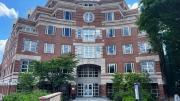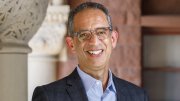The harvard crimson reported in mid February that the number of admissions to the Graduate School of Arts and Sciences (GSAS) would be reduced 4.4 percent, affecting students seeking to enroll this coming fall. The reduction reflects an adjustment by the Faculty of Arts and Sciences (FAS) to the prospective flattening of the distribution of funds from the endowment, the faculty’s largest source of revenue, following recent weak investment results (see “The Endowment Ebbs,” November-December 2016). The newspaper quoted FAS dean Michael D. Smith as attributing the downsizing to “the flat endowment distribution that we will see next year and the drying up of some funds that we’ve used in the past to help admit some students,” whose education and living expenses are typically covered by the University.
A statement provided by FAS elaborated that the GSAS “is fundamentally committed to ensuring that current graduate students thrive during their time at Harvard.…Most Ph.D. students now receive a generous financial-aid package guaranteed for at least five years, which pays for tuition, fees, health insurance, and other benefits.” It also cited recent improvements in support, including, among other steps: summer research funding, fifth-year and dissertation-completion support, professional-development funding, and financial assistance for students expecting or adopting a child.
“In the process of developing the fall 2017 admissions targets in conjunction with the graduate financial-aid budget,” the statement continued, “it became clear that a modest year-over-year reduction in class size would be necessary in order to ensure no disruption of support for current students,” driven in part by the endowment results. “GSAS, the FAS dean, the [engineering and applied sciences] dean, the FAS divisional deans, and the offices of the president and provost worked together to ensure the smallest possible percentage reduction in admission targets for FAS-based Ph.D. programs.”
Two points merit consideration. First, this does not appear to be an effort to downsize certain graduate programs where demand for academic hiring has diminished (notably, the humanities, languages, history, and related fields)—a subject of understandable anxiety within the affected fields.
Second, exactly how GSAS sets its admissions targets is as much an art as a science. Some tiny doctoral programs admit one or two candidates annually; others welcome scores. The yearly allocation varies by program, prior enrollment yields among those admitted, new faculty appointments (and leaves and retirements), funding vicissitudes, and so on. For whatever reason, GSAS is providing only the percentage guidance on admissions overall—not specifying how many new graduate students it aims to admit, nor the absolute change from last fall or any differential effects among disciplines. At least in the near term, College officials have said that the reduced graduate-student cohort should not have any effect on the availability of teaching assistants or section sizes.
A final observation: this outcome illustrates the overwhelming importance of the endowment in funding the University and FAS (which derived 51 percent of its operating income from endowment distributions in fiscal year 2016). Even in a period when The Harvard Campaign has raised well more than $7 billion in new gifts and pledges, core academic operations remain vulnerable to persistently weak endowment earnings.








